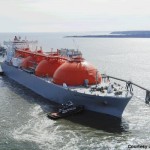 By Peter Galuszka
By Peter Galuszka
Energy firms and utilities are finding themselves in an odd and unexpected position because of the fast-changing dynamics of the natural gas market.
In a blow to the Sierra Club, a Maryland judge has ruled that Richmond-based Dominion Resources can export liquefied natural gas from its Cove Point facility on the western shore of the Chesapeake Bay south of Annapolis. Dominion may invest up to $3.5 billion in the facility.
It may sound like a big win for Dominion and other gas traders, but it may not exactly be. As the New York Times points out, energy firms got into a jam when they started building huge port facility to import LNG from abroad. Many of them are in the Gulf Coast petroleum complex.
“Fracking” for natural gas has turned everything upside down. Thanks to the controversial drilling method, used notably from western New York State to West Virginia and in western states, the U.S. energy market is flooded with cheap natural gas that is displacing coal as a fuel for electricity generation and possibly nuclear.
So, energy firms want to turn their big White Elephant import facilities into ones that can export gas, the Times says.
On the surface, it makes sense. This past year, gas prices were three times higher in Europe than in the U.S. In fact, coal firms made up for their losses thanks to gas in the U.S. market by shipping more coal to European utilities.
The Times says that 15 proposed terminals have filed for permission to export gas, including Cove Point.
The problem is that it takes time to build such facilities and by the time they are built, global markets for natural gas could erode as quickly as they have expanded. Other countries are busy trying to follow the American example with fracking and if they succeed, would-be American exporters could lose their race against time.
In the Cove Point case, the Sierra Club had said that a 2005 legal settlement with Dominion had prohibited natural gas exports through Cove Point although the Maryland judge disagrees.
Glen Besa of the Sierras Club was quoted as saying that exporting gas could raise domestic prices by diminishing domestic supply. Besides, utilities should be concentrating on renewable energy sources not fossil fuels like gas. There have also been concerns that LNG ships could be potentially catastrophic bombs if they are involved in an accident.
While there are many questions about the environmental soundness of fracking, which involves shooting toxic chemicals at high pressure deep underground. There’s no denying the sudden economic boom that has resulted from the practice. And if experience with other fossil fuels such as coal is a guide, the gas spigot could shut down just as quickly as it opened up.


